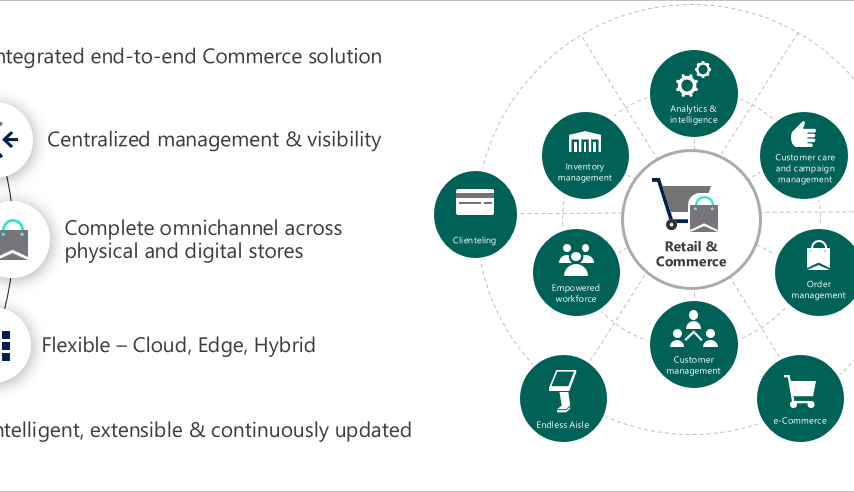In today’s highly competitive retail landscape, customer engagement and sales growth are paramount to achieving success. To meet these market needs, retailers are turning to innovative solutions like Microsoft Dynamics 365 CRM. This powerful customer relationship management platform empowers retailers to enhance customer engagement, personalize experiences, and drive sales growth. In this educational article, we will explore how Dynamics 365 CRM can revolutionize the retail industry, offering insights into its capabilities and highlighting real-world success stories.
I. Understanding the Retail Landscape and Market Needs:
The retail industry is evolving rapidly, driven by changing consumer expectations and digital advancements. Customers seek personalized experiences, seamless interactions across channels, and relevant offers. To thrive in this competitive market, retailers must prioritize customer engagement and sales growth. Dynamics 365 CRM addresses these market needs by providing a comprehensive platform to manage customer relationships, track interactions, and deliver targeted marketing campaigns.
II. Leveraging Dynamics 365 CRM for Retail Success:
A. Customer Engagement:
Dynamics 365 CRM enables retailers to build strong customer relationships by understanding their preferences and delivering personalized experiences. With comprehensive customer profiles, retailers can track customer interactions, preferences, and purchase history. By leveraging this data, retailers can create targeted marketing campaigns, deliver personalized offers, and engage customers across multiple channels. This enhances customer loyalty, drives repeat purchases, and fosters brand advocacy.
B. Sales Growth:
Dynamics 365 CRM equips retailers with powerful tools to drive sales growth. Sales teams can efficiently manage leads, track opportunities, and prioritize activities using the platform’s intuitive interface. Real-time dashboards and analytics provide insights into sales performance, enabling retailers to make data-driven decisions. By automating sales processes and streamlining workflows, retailers can optimize conversion rates, increase average order value, and drive overall sales growth.
Benefits of Dynamics 365 CRM in the Retail Industry:
Implementing Dynamics 365 CRM offers numerous benefits for retailers:
Enhanced Customer Satisfaction: By personalizing interactions and delivering relevant offers, retailers can significantly improve customer satisfaction and loyalty.
Increased Sales Revenue: The streamlined sales processes and targeted marketing campaigns enabled by Dynamics 365 CRM contribute to increased sales revenue.
Operational Efficiencies: With automated workflows, centralized customer data, and seamless integration with other retail systems, retailers can improve operational efficiencies and reduce manual tasks.
Data-Driven Insights: Dynamics 365 CRM provides advanced analytics and reporting capabilities, allowing retailers to gain valuable insights into customer behavior, sales trends, and marketing effectiveness.
Best Practices for Implementing Dynamics 365 CRM in Retail:
To ensure a successful implementation of Dynamics 365 CRM, retailers should consider the following best practices:
Clearly Define Goals: Identify specific objectives, such as improving customer engagement or increasing sales revenue, to align the implementation with business needs.
Customization and Integration: Customize Dynamics 365 CRM to fit the unique requirements of your retail business and ensure seamless integration with existing retail systems.
User Adoption and Training: Provide comprehensive training programs to ensure employees understand the system’s capabilities and can effectively utilize Dynamics 365 CRM.
Ongoing Support and Maintenance: Establish a support system to address user queries and provide ongoing maintenance and updates to keep the platform running smoothly.
Conclusion:
Dynamics 365 CRM is a game-changer for the retail industry, offering retailers the tools they need to enhance customer engagement and drive sales growth. By leveraging its capabilities, retailers can deliver personalized experiences, gain insights from data, and optimize sales processes. Embracing Dynamics 365 CRM positions retailers at the forefront of the evolving retail landscape, helping them to gain a competitive edge and thrive in today’s market.
Implementing Dynamics 365 CRM enables retailers to elevate customer engagement to new heights. By understanding customer preferences, retailers can create tailored experiences that resonate with their target audience. With Dynamics 365 CRM’s comprehensive customer profiles, retailers gain valuable insights into customer behavior, enabling them to anticipate needs, deliver personalized recommendations, and provide exceptional service. Whether it’s personalized email campaigns, targeted promotions, or loyalty programs, Dynamics 365 CRM empowers retailers to build lasting relationships with their customers.
Moreover, Dynamics 365 Sales CRM facilitates seamless omni-channel experiences. In today’s digital age, customers expect consistent interactions across various touchpoints, be it online, in-store, or through mobile devices. Dynamics 365 CRM integrates data from multiple channels, allowing retailers to provide a seamless experience throughout the customer journey. Customers can start browsing products on a retailer’s website, continue their journey in a physical store, and complete their purchase via a mobile app—all while receiving personalized recommendations and consistent service.








